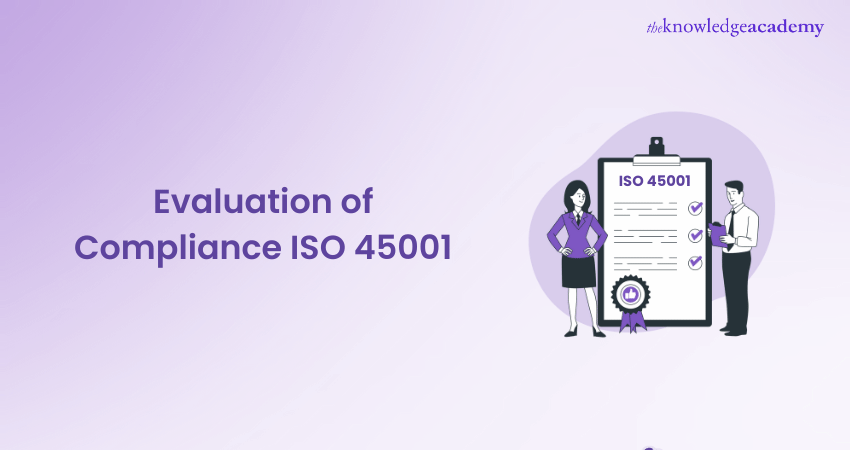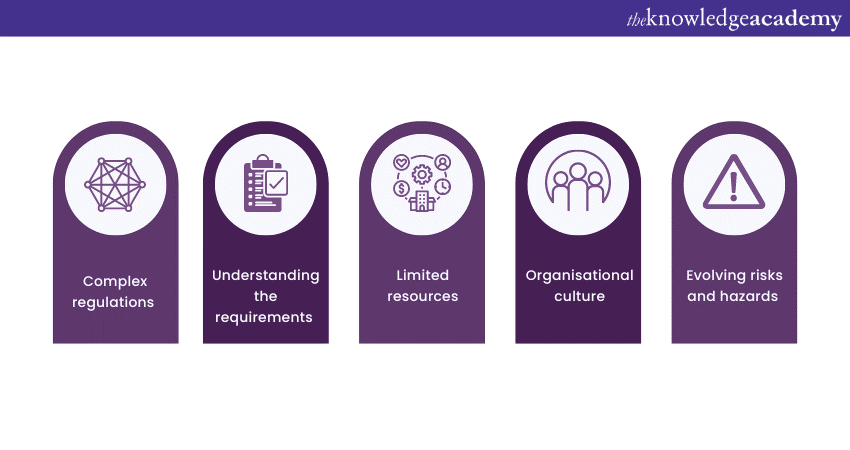We may not have the course you’re looking for. If you enquire or give us a call on +44 1344 203999 and speak to our training experts, we may still be able to help with your training requirements.
Training Outcomes Within Your Budget!
We ensure quality, budget-alignment, and timely delivery by our expert instructors.

Diving into the Evaluation of Compliance ISO 45001 is like unlocking the ultimate blueprint for workplace safety excellence. By understanding the Compliance clause (Clause 9.1.2) of ISO 45001, organisations can transform their safety protocols and align with global standards.
This blog explores the Evaluation of Compliance ISO 45001 by uncovering its essential steps, compliance must-haves, and the significant advantages of adhering to this standard. Join us on this journey to elevate your safety game!
Table of Contents
1) Understanding ISO 45001 Compliance
2) ISO 45001 Clause 9: Performance Evaluation
a) Monitoring, Measurement, Analysis, and Evaluation (Clause 9.1)
b) Incident Investigation, Nonconformity, Corrective Action, and Preventive Action (Clause 9.1)
c) Internal Audit (Clause 9.2)
d) Management Review (Clause 9.3)
e) Evaluation of Compliance – Clause 9.1.2
f) Determination of Legal and Other Requirement - Clause 6.1.3
3) Challenges in Compliance
4) Conclusion
Understanding ISO 45001 Compliance
Compliance with ISO 45001 is crucial for organisations seeking to establish and maintain effective OH&S management systems. By adhering to the requirements of this internationally recognised standard, organisations can proactively identify and mitigate workplace hazards, ensure employee well-being, and foster a culture of safety within their operations.
ISO 45001 gives a systematic approach to managing OH&S risks and opportunities. It provides a framework that helps organisations establish policies, objectives, and processes to prevent work-related injuries, illnesses, and fatalities. Complying with ISO 45001 showcases an organisation's dedication to establishing a safe and healthy workplace for all stakeholders, including employees, contractors, visitors, and others.

ISO 45001 Clause 9: Performance Evaluation
Clause 9 of ISO 45001 focuses on the performance evaluation of an organisation's health and safety management system. It provides guidelines and requirements for assessing the effectiveness and efficiency of the implemented controls and processes and monitoring the achievement of OH&S objectives.
Compliance with Clause 9 enables organisations to systematically assess the effectiveness of their OH&S management system in achieving the intended outcomes and complying with legal and other requirements. By adhering to the requirements of Clause 9, organisations can effectively evaluate their OH&S performance, ensure compliance and identify areas for improvement. It outlines several key performance evaluation requirements, detailed in the following sections.
Monitoring, Measurement, Analysis, and Evaluation (Clause 9.1)
Organisations must establish and implement processes to monitor and measure their OH&S performance. This involves collecting data, conducting inspections, and utilising indicators and metrics to assess the effectiveness of controls, identify trends, and evaluate compliance with objectives and targets. Organisations should analyse and evaluate this data to determine the performance against set criteria, identify opportunities for improvement, and make informed decisions regarding OH&S performance.
Start your journey to making workplaces healthy and safe with our ISO 45001 Certification - Sign up now!
Incident Investigation, Nonconformity, Corrective Action, and Preventive Action (Clause 9.1)
Organisations must have procedures in place to investigate incidents, accidents, and nonconformities related to OH&S. This includes identifying the root causes, implementing corrective actions to prevent a recurrence, and evaluating the effectiveness of these actions. Additionally, organisations should take proactive measures to identify and mitigate potential risks, implementing preventive actions to avoid incidents and improve overall OH&S performance.
Internal Audit (Clause 9.2)
Organisations must conduct regular Internal Audits of their OH&S management system to assess its conformity with ISO 45001 Requirements and the organisation's established criteria. Internal audits provide an opportunity to identify strengths, weaknesses, and opportunities for improvement within the system. They also help ensure compliance with policies, procedures, and legal requirements and provide a platform for employee involvement and engagement in the improvement process.
Management Review (Clause 9.3)
Top management must review the OH&S management system periodically to ensure its suitability, adequacy, effectiveness, and alignment with the organisation's strategic direction.
The management review assesses the system's overall performance, the achievement of objectives and targets, and the allocation of resources. It also provides an opportunity for management to make decisions regarding the improvement of the system and the allocation of necessary resources.
Evaluation of Compliance – Clause 9.1.2
According to ISO 45001, organisations must implement, establish and maintain a process for evaluating compliance with legal and other requirements mentioned in clause 6.1.3. To comply with this requirement, organisations should:
a) Determine the frequency and method(s) of a compliance evaluation.
b) Evaluate compliance and take necessary actions. (referred to in clause 10.2).
c) Maintain knowledge and understanding of their compliance status regarding legal and other applicable requirements.
d) Retain documented information on the results obtained from compliance evaluations.
Determination of Legal and Other Requirement - Clause 6.1.3
According to clause 6.1.3 in ISO 45001, organisations must establish, implement, and maintain a process to:
Identify and access current legal and other hazards-related requirements, OH&S risks, and the OH&S management system.
Determine the application of these requirements to the organisation and identify the necessary communication.
Consider these requirements when establishing, implementing, maintaining, and improving the OH&S management system.
Enhance your organisation's occupational health and safety management system with ISO 45001 Foundation Training.
Challenges in Compliance with ISO 45001
While compliance with ISO 45001 and meeting legal and other OH&S requirements is crucial, organisations often face challenges in achieving and maintaining compliance. Recognising and addressing these challenges is essential to effectively implement the occupational health and safety (OH&S) management system.

Here are some common challenges that organisations may encounter:
Complex Regulations Landscape
The legal and regulatory landscape governing OH&S varies across different countries and industries. Navigating through complex and ever-changing regulations can be daunting for organisations.
Different geographical regions may have specific requirements, making staying updated and ensuring full compliance challenging. Organisations must invest time and resources to understand the applicable regulations and monitor any changes or updates.
Interpretation and Understanding of Requirements
Interpreting legal and other OH&S requirements can be complex, leading to different understandings and interpretations among employees and stakeholders. Misinterpretation can fail to address specific requirements. Organisations must provide clear guidance, training, and communication to ensure a common understanding of the requirements and their implications.
Ensure your organisation's safety and compliance as an internal auditor with ISO 45001 Internal Auditor Training - Register now!
Resource Constraints
Compliance with ISO 45001 and OH&S requirements often requires significant financial, human, and technological resources. Some organisations may need more resources, making allocating sufficient time, personnel, or financial support for compliance activities challenging. Limited resources can hinder establishing robust processes, implementation necessary controls, and investment in training and technology.
Organisational Culture and Engagement
Achieving compliance requires a strong commitment and engagement from all levels of the organisation. Resistance to change or lack of awareness and understanding of the importance of compliance can hinder progress. Creating a positive safety culture and fostering employee engagement is crucial for ensuring compliance. Organisations should promote open communication, provide training and education, and involve employees in decision-making.
Evolving and Emerging Risks
The nature of hazards and risks in the workplace is constantly evolving, requiring organisations to stay proactive in identifying and addressing emerging risks. New technologies, work practices, or industry developments may introduce new risks organisations must manage. Anticipating and adapting to these emerging risks can be challenging, as organisations must continually review and update their processes and controls to ensure ongoing compliance.
Integration with Business Operations
Compliance with ISO 45001 and OH&S requirements often requires significant financial, human, and technological resources. Some organisations may need more resources, making allocating sufficient time, personnel, or financial support for compliance activities challenging. Limited resources can hinder establishing robust processes, implementation necessary controls, and investment in training and technology.
Learn the principles, terms and definitions of ISO 45001 with our comprehensive ISO 45001 Lead Auditor training.
Conclusion
Organisations can ensure legal compliance and reduce risks by identifying noncompliance, implementing corrective actions, and maintaining documentation. Despite challenges like complex regulations and resource constraints, organisations must prioritise compliance, foster engagement, and integrate safety practices into their operations. Evaluation of Compliance With ISO 45001 is vital for creating safe workplaces, improving OH&S performance, and demonstrating a commitment to employee well-being.
Learn the principles, terms and definitions of ISO 45001 with our comprehensive ISO 45001 Lead Auditor training.
Frequently Asked Questions

A thorough compliance evaluation of ISO 45001 offers benefits such as risk mitigation, legal compliance and employee safety.

Some of the best practices for evaluating compliance with ISO 45001 include establishing a robust compliance framework, develop structured procedures and staying informed on regulatory updates.

The Knowledge Academy takes global learning to new heights, offering over 30,000 online courses across 490+ locations in 220 countries. This expansive reach ensures accessibility and convenience for learners worldwide.
Alongside our diverse Online Course Catalogue, encompassing 17 major categories, we go the extra mile by providing a plethora of free educational Online Resources like News updates, Blogs, videos, webinars, and interview questions. Tailoring learning experiences further, professionals can maximise value with customisable Course Bundles of TKA.

The Knowledge Academy’s Knowledge Pass, a prepaid voucher, adds another layer of flexibility, allowing course bookings over a 12-month period. Join us on a journey where education knows no bounds.

The Knowledge Academy offers various ISO Certification Courses, including the Integrated Management System Course and the ISO 10002 Quality Management Course. These courses cater to different skill levels, providing comprehensive insights into What is ISO.
Our ISO & Compliance Blogs cover a range of topics related to ISO Certifications, offering valuable resources, best practices, and industry insights. If you are looking for a way to gain ISO Certifications for your business, The Knowledge Academy's diverse courses and informative blogs have got you covered.
Upcoming Health & Safety Resources Batches & Dates
Date
 ISO 45001 Foundation
ISO 45001 Foundation
Mon 3rd Mar 2025
Mon 5th May 2025
Mon 7th Jul 2025
Mon 8th Sep 2025
Mon 3rd Nov 2025







 Top Rated Course
Top Rated Course


 If you wish to make any changes to your course, please
If you wish to make any changes to your course, please


